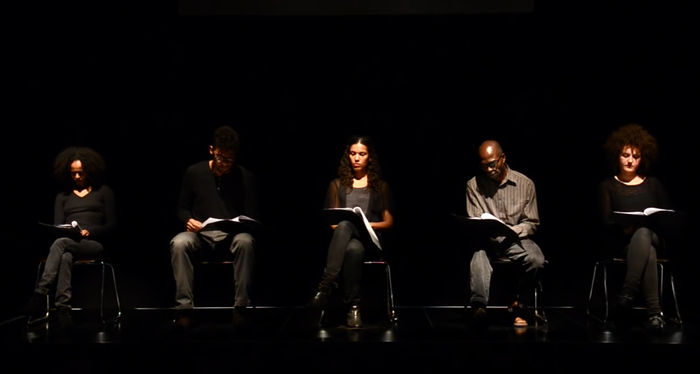Memórias, Resgates e Riscos
Moderadora: Manuela Ribeiro Sanches (Faculdade de Letras da Universidade de Lisboa)
Organizado por: Mónica de Miranda
Data: 3 de Novembro, 2017 (Sexta-feira), 19h
Morada: Rua Damasceno Monteiro, 12 – Graça.
ENTRADA LIVRE

DETALHES
O Hangar em parceria com as edições Orfeu Negro e a Faculdade de Letras da Universidade de Lisboa organiza uma conversa pública com a artista Grada Kilomba moderada por Manuela Ribeiro Sanches. A artista falará sobre sua prática artística com um destaque sobre o livro “Memórias da Plantação: Episódios do Racismo Diário”, com apoio da vídeo-documentação da leitura encenada de episódios que exploram o racismo quotidiano em forma de histórias psicanalíticas, vinculando teoria pós-colonial com narrativa lírica. A combinação dessas duas palavras, plantação e memórias, descreve o racismo não apenas como o reencenar de um passado colonial, mas também como realidade traumática actual.
Biografia
Grada Kilomba é uma escritora, teórica, e artista interdisciplinar portuguesa residente em Berlim. O seu trabalho baseia-se na memória, trauma, raça e gênero, e foi traduzido em várias línguas e publicados em inúmeras antologias internacionais, bem como encenado internacionalmente. O seu trabalho é especialmente conhecido por criar um espaço híbrido onde as fronteiras entre as linguagens académicas e artísticas se confinam, usando uma variedade de formatos desde a escrita à encenação dos seus textos, assim como instalações de video e performance, criando o que ela chama de “Performing Knowledge.”
Grada Kilomba tem apresentado o seu trabalho em renomeados espaços de exibição, teatro, e academia, como o Vienna Secession Museum, Brussels Bozar Museum, London Maritime Museum, Centro International de Artes José de Guimarães, Kampnagel House, Oslo Literature House, Maxim Gorki Theater, Berliner Festspiel Haus, Ballhaus Naunynstrasse, Theater Münchner Kammerspiel, University of Stockholm, University of Amsterdam, University of London, University of Accra, Universidade do Rio de Janeiro, Academy of Fine Arts in Vienna, among others.
Grada Kilomba tem ensinado em diversas universidades internacionais, tendo sido por último Professora de Estudos de Gênero e Estudos Pós-Coloniais, na Universidade de Humboldt, em Berlim. Actualmente, Grada Kilomba é curadora no Teatro Maxim Gorki, em Berlim, onde está a desenvolver uma série de Artist Talks e Post-colonialismo.
Manuela Ribeiro Sanches é professora aposentada da Faculdade de Letras da Universidade de Lisboa, onde ensinou entre 1981 e 2016. Tendo feito o seu doutoramento sobre o viajante e revolucionário Georg Forster, o seu interesse por literatura de viagens e tópicos relacionados, tais como os processos que sustentam a perceção e narração dos objetos descritos, levou-a a alargar a sua pesquisa ao campo da história da antropologia, em articulação com os estudos culturais, a partir de uma perspetiva pós-colonial. Tendo dedicado a sua atividade de docência e investigação a estudar os efeitos e repercussões, até ao presente, dos processos de (des)colonização a nível cultural e político, interessou-se, mais recentemente, pelos movimentos anticoloniais, nas suas vertentes nacionalista e transnacional. As suas áreas de interesse e investigação incluem ainda o cinema africano e questões ligadas às migrações e racismos na Europa numa perspetiva comparada. Publicações recentes: Europe in Black and White: Immigration, Race, and Identity in the “Old Continent” (Intellect, 2011) e Malhas que os impérios tecem. Textos anti- coloniais, contextos pós-coloniais’ (Edições 70, 2011). De momento está a organizar um volume reunindo um conjunto de textos sobre Cabral, Césaire and Du Bois a publicar em 2018.
Sobre PLANTATION MEMORIES
“Com uma escrita profunda e uma linguagem cortante e eloquente, Grada Kilomba expõe a violência e o trauma do racismo no seu livro “Plantation Memories. Episódios de Racismo Diário”. Esta leitura cênica traz o livro ao palco, através de uma compilação de episódios que exploram o racismo diário em forma de histórias psicanalíticas curtas. Oferecendo uma visão forte e comovente, através das diferentes personagens. ”
Teatro Ballhaus Naunynstrasse, Berlin
OUTRAS ACTIVIDADES DA ARTISTA em Lisboa
GALERIA AVENIDA DA ÍNDIA
THE MOST BEAUTIFUL LANGUAGE
Exposição individual
Curadoria: Gabi Ngcobo
Produção Criativa: Moses Leo
27 Outubro 2017 a 4 Março, 2018
Inauguração 26 Outubro, 18h
Entrada gratuita
Avenida da Índia, 170 – Belém – 1400-207 LISBOA
www.egeac.pt
www.facebook.com/galeriasmunicipaislisboa
www.instagram.com/galeriasmunicipais
TEATRO MARIA MATOS
CONVERSA com Grada Kilomba e Carla Fernandes
Práticas de descolonização: uma conversa a partir da obra de Grada Kilomba
Outubro 28 18h30
Avenida Frei Miguel Contreiras, 52
www.teatromariamatos.pt
MAAT – MUSEU DE ARTE, ARQUITETURA E TECNOLOGIA
SECRETS TO TELL
Exposição individual
CuradoriaInês Grosso
PROJECT ROOM
8 Novembro 2017 a 5 Fevereiro 2018
Inauguração 7 Novembro, 19h
Av. Brasília | Central Tejo, Belém
www.maat.pt
www.facebook.com/pg/maatmuseum
Organização e coordenação científica: Mónica de Miranda.
Este projeto faz parte do projeto Pós-Arquivo: Política de Memória, Lugar e Identidade, CITCOM-CEC-FLUL
Este projecto foi produzido com financiamento nacional da FCT – Fundação para o Ciência e Tecnologia, IP, no âmbito do projeto UIDB / 00509/2020
